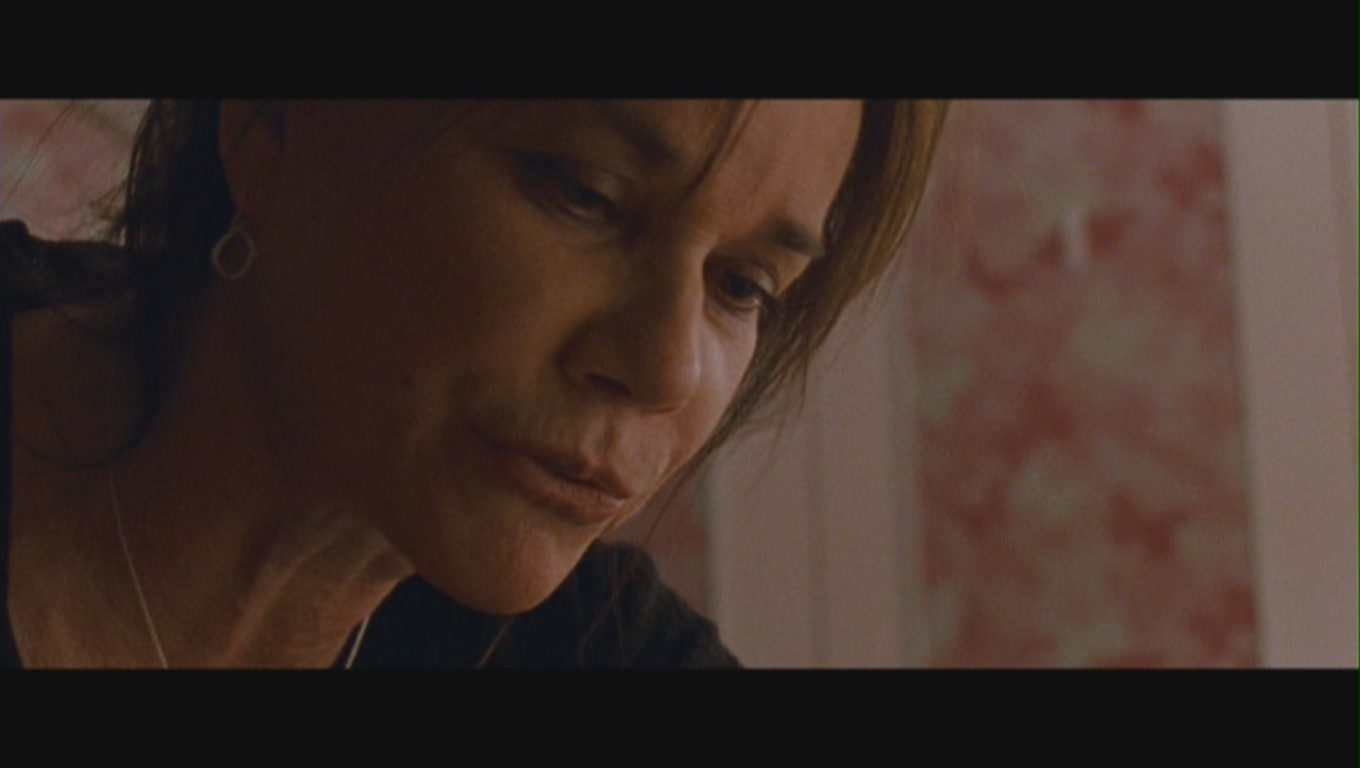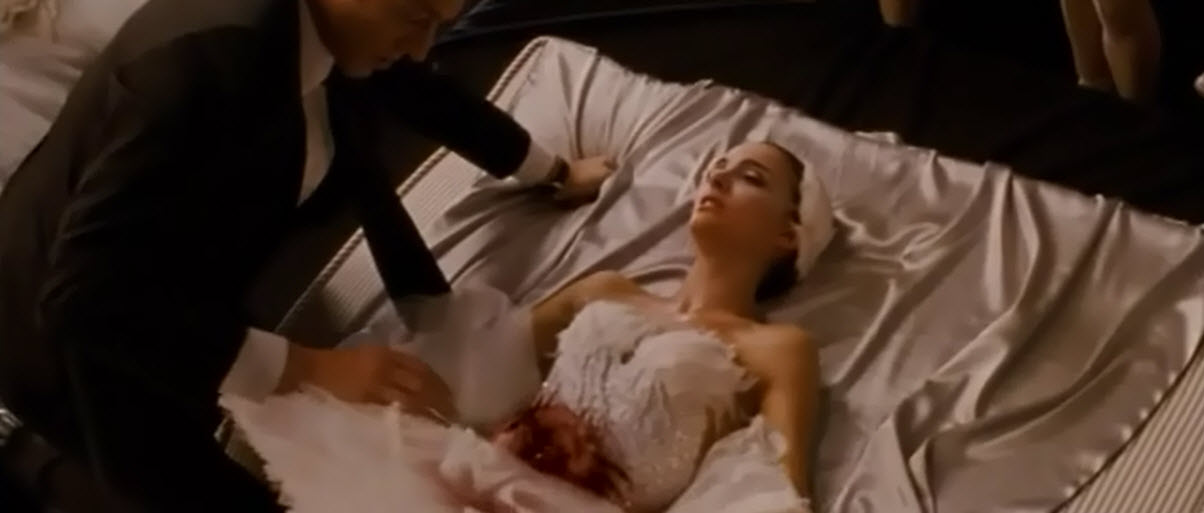
Figure 1. Black Swan Poster Art
Black Swan is the answer to a true in home operatic experience and what a part it plays with a story spanning a lifelong pursuit of perfection. But what is perfection when perfection itself is to in fact be “imperfect”. An amazing symbolic montage of life “behind the mirror” only in this case intertwined with the diabolical effects of schizophrenia. The road to perfecting the “Black Swan” of the fabled “Swan Lake” has many twists and turns, with most of which ending with poor Nina Sayers being pushed into another sexual conflict only to release her inner “Black” monster.
•Directed by: Darren Aronofsky
•Written by: Mark Heyman, Andres Heinz & John McLaughlin
•Cast: Natalie Portman as Nina Sayers, Mila Kunis as Lily, Vincent Cassel as Thomas Leroy, Barbara Hershey as Erica Sayers, Winona Ryder as Beth Macintyre & Benjamin Millepied as David.
•Genre: Mystery, Suspense & Drama
•Duration: 108 Minutes (aprox)

Figure 2. "I have a little homework assignment for you, go home and touch yourself"
“Black Swan” follows the talented dancer Nina Sayers (Natalie Portman), a young girl who never mentally matured but was merely manicured to follow in her mother’s footsteps, the perfect little girl a synonym of innocence. It is the onset of Swan Lake and influences from her forceful instructor Thomas Leroy (Vincent Cassel), to develop Nina into something less than perfect, namely “the opposite” of her psyche, her doppelganger & the imperfect “Black Swan”. Nina dives into her role physically but ranges into the mental-physical after rampant hallucinations of herself “letting go”, embracing her inner monster in a flurry of schizophrenic psychosis.
“Psychosis,” a common condition in schizophrenia, is a state of mental impairment marked by hallucinations, which are disturbances of sensory perception, and/or delusions, which are false yet strongly held personal beliefs that result from an inability to separate real from unreal experiences. Less obvious symptoms, such as social isolation or withdrawal, or unusual speech, thinking, or behavior, may precede, be seen along with, or follow the psychotic symptoms. (Schizophrenia.com, 2011)

Figure 3. "What happened to my sweet girl?”
Black Swan’s onset of mirrors one could call windows into the soul expressing Nina’s bottled up inner imperfections arising to the surface of her psyche. One could argue that this psyche was built purely from her interpretations of the laid back Lily (Mila Kunis) to which she observed and attempted to embody. Nina’s creative breakthrough inevitably fuses with the vulnerabilities in her adolescence to the levels of the psychiatric, fat stoked in the proverbial pan of her domineering mother Erica Sayers (Barbara Hershey) who is so vigorous with her little girl remaining the embodiment of perfection.
Portman has decisively moved out of the ugly duckling phase of her career with this tremendous performance as Nina, a hardworking corps member of a New York City ballet company who has low-level dieting and self-harm issues more or less under control. She lives with her difficult mother – an impressive and satisfyingly nasty performance from Barbara Hershey – who abandoned her own stagnant ballet career on being impregnated by some heartless, mercurial mogul or other, and channelled her rage and disappointment into coaching the resulting daughter, whom she has attempted to infantilise by filling her pink bedroom with gonks and installing a deplorable musical box that tinkles the theme from Swan Lake. (Bradshaw, 2011)

Figure 4. “You made her my Alternate?”
The final decision to make Lily Nina’s alternate for Swan Lake set astir a higher level of controversy between the two. One could argue that at that point Nina considered Lily her doppelganger (the darker side of herself) who at numerous points reflected Nina’s own sadistic smile (and face) back at her, creating the hallucinogenic mirror effect all over again. It is only until Nina wounds Lily that she is able to truly embrace that dark side of herself to the level that was asked of her from minute one, to truly accept her own metamorphosis as the imperfect “Black Swan”.
To define the definition of Alternate:
n. (-n t)But in relation with this analogy:
1. A person acting in the place of another; a substitute (Farlex, 2011)
A double or identical replica of a person. The concept revolves around the belief that everyone has a doppelganger, an identical copy of themselves somewhere in the world. If the person is good then the doppelganger will be evil and vice versa. It is even said that if the two should meet then they will both perish. (Unexplained-Mysteries.com, 2011)

Figure 5. “I felt it. Perfect. I was perfect”
To Summarize
“Black Swan” is based on the parental issues reviewed in our previous film splice only in a more visceral way. Erica Sayers forced ballet life on her daughter Nina merely because she was not perfect herself, she had a child and decided to smother her, to mould & shape her into her own warped view of innocent perfection, a plan incomplete personified by a collage of incomplete paintings on her wall. One could argue that It was Nina’s need to be perfect, to satisfy that mind set instilled by her mother that ultimately made her create an alternate identity that was unbound by limitation. Nina had to let that frigid little girl go just so she could maintain her ideal, her illusion of true perfection.
The danger with this way of thinking is that whilst it’s great to feel good about yourself when you do well, if your confidence is so dependent on your success and achievements, what happens when you *don’t* do well? Your confidence becomes as unstable as a dandelion in the breeze, flying this way or that as the winds of success come and go. By handing over the control of your confidence to the winds of change, it leaves you vulnerable and fearful of failure. And when you do fail, as we all do sometimes, you feel worthless. The highs and lows that come with perfectionism are extreme. Who you are inside and how you feel inside is independent of external things. It is our thought processes that connect the external and internal worlds as if they were intrinsically connected. In fact they aren’t connected at all. The connection is just an illusion of the mind. (Or, 2011)
List of Illustrations
Figure 1. Black Swan Poster Art. (com) [Online image]. At:
http://conradolson.com/wp-content/uploads/2011/02/black_swan_ver7.jpg
(Accessed on: 12/10/11)
Figure 2. I have a little homework assignment for you, go home and touch yourself. (com) [Online image]. At:
http://3.bp.blogspot.com/_OMHy_G6FX48/TIzW9gkmXYI/AAAAAAAAEck/efJFbjKfQgo/Black-Swan-2.jpg (Accessed on: 12/10/11)
Figure 3. What happened to my sweet girl? (com) [Online image]. At:
http://images4.fanpop.com/image/photos/23300000/Barbara-Hershey-as-Erica-Sayers-in-Black-Swan-barbara-hershey-23367085-1360-768.jpg (Accessed on: 12/10/11)
Figure 4. You made her my Alternate? (com) [Online image]. At:
https://blogger.googleusercontent.com/img/b/R29vZ2xl/AVvXsEh205llKLL6jdnjrQkmQGw-f119mthYVZKptDcBN51jiyL-mHqBrwnYHGby4Z_YnJYlOIPi0t8ZW5YsPHyg-vlDHzj_gsTq_raxzySzUpid_9TDel87tl3CxNsD7QYs6leEF25BhoAlcWQ/s1600/lily_black_swan-6859.png (Accessed on: 12/10/11)
Figure 5. I felt it. Perfect. I was perfect. (com) [Online image]. At:
http://vigilantcitizen.com/wp-content/uploads/2011/01/blackswan161.jpg
(Accessed on: 12/10/11)
Bibliography
Schizophrenia.com. (2011) Overview of Schizophrenia At:
http://www.schizophrenia.com/family/sz.overview.htm (Accessed on: 12/10/11)
Bradshaw, Peter. (2011) Black Swan Review At:
http://www.guardian.co.uk/film/2011/jan/20/black-swan-review (Accessed on: 12/10/11)
Farlex, Dictionary. (2011) Dictionary Term for “Alternate” At:
http://www.thefreedictionary.com/alternate (Accessed on: 12/10/11)
Unexplained-Mysteries.com. (2011) Modern Mysteries - Doppelganger At:
http://www.unexplained-mysteries.com/viewarticle.php?id=201 (Accessed on: 12/10/11)
Li, Or. (2011) Perfectionism: Why do I want to be perfect? At:
http://www.saywhydoi.com/perfectionism-why-do-i-want-to-be-perfect/
(Accessed on: 12/10/11)

No comments:
Post a Comment